Maintaining good gut health is an important aspect of any person’s life, especially when it comes to your child, which is why it’s important to choose the best baby probiotics.
The best baby probiotics are those that help to stimulate the growth of good bacteria and maintain a good balance between the good and the bad bacteria residing inside your little one’s digestive tract.
While you’d normally expect a child to have a stable immune system from the moment they are born, over the course of the last century our nutrition has become more and more chemical-based, which has resulted in the degradation of our overall gut health.
The mother’s diet isn’t the only thing that affects the strength of the microbiome of beneficial bacteria in your baby’s gut.
There are also several other factors, namely whether the baby was born naturally or via C-section.
Then there are babies who’ve had to take antibiotics, and the kids who were fed on baby formula rather than breast milk due to an allergy or some other choice or issue as well.
Maintaining a healthy level of gut bacteria isn’t that easy though, especially when it’s somebody else’s as you can’t feel the effects, but probiotics definitely help to this end.
It’s important to research what the best baby probiotics are though, because some can get quite pricey and others can be outright ineffective. Let’s take a look at what the best ones are, then.
The 8 Best Baby Probiotics
1. Klaire Labs Ther-Biotic Infant Probiotic Powder
- A multispecies probiotic to meet the special needs of infants.*
- 5 billion CFU blend of five Lactobacillus and five Bifidobacterium species.
- Powder can be mixed with expressed breast milk, or solid food at room temperature.*
- Hypoallergenic* product free of the following common allergens: milk/casein, eggs, fish, shellfish, tree nuts, peanuts, wheat, gluten, and soybeans. Contains no artificial colors, flavors, or preservatives.
Prices pulled from the Amazon Product Advertising API on:
Product prices and availability are accurate as of the date/time indicated and are subject to change. Any price and availability information displayed on [relevant Amazon Site(s), as applicable] at the time of purchase will apply to the purchase of this product.
First on my list is the Klaire Labs probiotic, that comes in powder form.
It’s a gluten-free, hypoallergenic mix of 10 different strains of probiotic, 5 from the lactobacillus family and 5 from the bifidobacterium, all carefully selected to be completely safe for your precious child, and adding up to a whopping 10 billion CFUs!.
It contains no artificial preservatives, flavors or colors either.
Not to mention that it’s easy to give to children by mixing the powder with some baby milk, or by putting it over a toddler’s food or baby formula.
As far as allergies go, this probiotic is free from the following allergens:
• Eggs
• Shellfish
• Gluten
• Soybeans
• Fish
• Casein
• Milk
• Wheat
• Peanuts/tree nuts
A product that’s both affordable and helps cover all your bases, without causing any issues with your baby’s digestion.
This is due to all the probiotic strains it contains creating an L(+) isomer of lactic acid, which can be properly metabolized by infant digestive systems.
Make sure to remember that every probiotic needs proper refrigeration to retain its potency, so make sure to follow the storage instructions to the letter.
2. Seeking Health ProBiota Infant Powder
- POTENT BABY PROBIOTIC: Seeking Health’s ProBiota Infant Powder and infant multivitamin is specially formulated to support healthy digestion and absorption of nutrients through breast milk, formula, or solid foods.*
- SUPPORTS A HEALTHY DIGESTIVE SYSTEM: The Seeking Health probiotic infant powder contains five bifidobacterium species that are typically present in an infant’s gastrointestinal tract to support the body’s natural defenses.*
Prices pulled from the Amazon Product Advertising API on:
Product prices and availability are accurate as of the date/time indicated and are subject to change. Any price and availability information displayed on [relevant Amazon Site(s), as applicable] at the time of purchase will apply to the purchase of this product.
Next up is the Seeking Health infant powder, another potent probiotic that helps to reinforce your child’s natural defense against infections.
This probiotic contains 5 different types of lactobacillus and 5 bifidobacterium species, each of which are commonly found inside a child’s digestive tract already, providing fast absorption of the probiotic and reinvigoration of the immune system.
A dietary supplement that is certified by Dr. Ben Lynch as a very potent probiotic, with over 10 billion CFUs in one quarter teaspoon measure, each of which help combat inefficient absorption of nutrients from food.
This product is also free of allergens like dairy, eggs, peanuts, soybeans and tree nuts as well as being gluten-free, vegetarian and vegan friendly.
Health ProBiota Infant Powder isn’t treated with any artificial sweeteners and has a completely natural flavor.
It comes in a powder that you can mix into your infant’s bottled milk or baby formula and you can even sprinkle it as “seasoning” on to solid food for a toddler.
3. Probonix Kids Probiotic for Toddlers and Children
- FREE KIDS FROM TUMMY TROUBLE - Probonix will help your little one reach a healthy balance of bacteria in the gut, leading to a healthier immune system, better digestion, and lower chances of long-term GI health issues. Probonix could help your child with issues like: gas, colic, thrush, diarrhea, eczema, constipation, asthma, lactose intolerance, and more!
- PROPRIETARY FORMULA INCREASES EFFECTIVENESS - For a probiotic to be effective, the live bacterial cultures must survive the harsh environment of your stomach to reach your intestinal tract. Probonix’s one-of-a-kind acid-coating process enables the live bacteria culture to pass safely through the destructive and acidic environment of your stomach and into your gut. Competing products may promise more probiotics per dose, but Probonix Restore will get more of them alive and to your gut.
Prices pulled from the Amazon Product Advertising API on:
Product prices and availability are accurate as of the date/time indicated and are subject to change. Any price and availability information displayed on [relevant Amazon Site(s), as applicable] at the time of purchase will apply to the purchase of this product.
Now here’s a probiotic that I can wholeheartedly recommend.
Firstly, because I’ve had personal experience using it with my own child and because it comes as a liquid probiotic with its own dropper, so you don’t have to go looking for your own.
It also has a delicious grape flavor and is perfect to mix into any liquids, if your little one doesn’t like taking things from a dropper.
Make sure you’re careful not to store this product over 110 °F, because the probiotic will start losing its potency.
Pasteurization is a two way process after all.
The good thing about this probiotic isn’t just the taste though, it’s the unique acid coating process that allows many of the helpful bacteria it contains to pass through to the intestinal tract, which results in its high efficacy
It also doesn’t require refrigeration and can be kept at room temperature without losing any of its strength.
The mixture only has 8 strains of probiotics this time around though, 3 lactobacillus and 5 bifidobacterium, though it still remains an effective tool for strengthening gut health by revitalizing the intestinal flora.
On top of all that, the product is all natural and fully non-gmo, free of gluten and chemical additives.
Plus, it’s also free of common allergens like soybeans, tree nuts, peanuts, fish, shellfish, dairy and eggs.
4. Wellements Organic Probiotic Drops, 0.25 Fl Oz, Baby Digestive and Immune Support for Infants and Toddlers
- Because healthy guts are happy ones, our probiotics help support your little one’s digestive and immune health. Our gut-friendly probiotic blend combined with organic olive oil makes for a simple, safe, and effective formula. Well tip: The organic olive oil in our product can solidify when placed in the refrigerator. Place bottle between hands for 1-2 minutes and shake well before use and for easy administration.
- RECOMMENDED FOR ALL AGES: Newborn+ Shake well before each use. Place 5 drops on nipple, pacifier, spoon or mix in breast milk or formula.
Prices pulled from the Amazon Product Advertising API on:
Product prices and availability are accurate as of the date/time indicated and are subject to change. Any price and availability information displayed on [relevant Amazon Site(s), as applicable] at the time of purchase will apply to the purchase of this product.
This is another liquid probiotic, this time from Wellements, who are known for their USDA certified products that are full of natural ingredients and bottled in a chemical-free process.
The other unique part of their liquid probiotic is the inclusion of olive oil, as an added unique flavor, to the blend of two different strains of powerful probiotics.
That said, the bottle does require refrigeration due to a lack of artificial preservatives, but this is more than fine as most other natural probiotics do as well.
However, this process will cause the olive oil inside to solidify, so the folks over at Wellements recommend warming the bottle up between your hands for a minute or two before shaking the bottle vigorously to mix all the ingredients back together.
After that, 5 drops should be enough for each use, either on top of a pacifier, mixed in with baby formula or bottled milk or simply applied directly to the nipple or the baby’s mouth.
Make sure you remember that the contents should be used up within 4 weeks. If there is any left, it should be thrown away.
5. Kids Probiotic Plus Colostrum by Upspring Baby
- COLOSTRUM PROVIDES ULTIMATE IMMUNITY SUPPORT with a complete range of antibodies make it the ideal probiotics for kids, toddlers and babies. Our colostrum for kids can be given to your 2 month old or your teenager. Mix in yogurt or any cool liquid.
- 5 BILLION ACTIVE CULTURES: Our kid and baby probiotics contain 5 BILLION ACTIVE CULTURES per dose that helps keep kids and babies healthy. This probiotic supplement can help provide constipation relief for kids and babies by acting as a gentle stool softener. Parents love saying goodbye to days without a bowel movement for their kids.
Prices pulled from the Amazon Product Advertising API on:
Product prices and availability are accurate as of the date/time indicated and are subject to change. Any price and availability information displayed on [relevant Amazon Site(s), as applicable] at the time of purchase will apply to the purchase of this product.
This is an affordable, powdered blend of 6 different probiotic and prebiotic strains. The Upspring baby variant comes pre-dosed in tiny packets, so you never have to measure by eye again.
It is safe to use for anyone over 2 months old, and even works well for teens and adults.
Their potent mix helps primarily with constipation, but it also works for reducing the effects of bloating, diarrhea and similar issues.
The product itself is all-natural, free of any sugars, hormones and even gluten.
It’s completely flavorless and can therefore be mixed into the child’s milk or baby formula without them even noticing the difference.
It all comes neatly packaged in 30 individual servings to help with proper dosage, leaving the rest of them fresh for when you need them.
6. Dr. Valerie Nelson’s Professional Infant, Childrens & Kids Probiotic
- EFFECTIVE FORMULA – 6 Times More Potent Compared to Similar Formulas. Gentle, Yet Professional Strength Probiotics for Kids - Made in the USA - 100% Naturally Formulated For Board Certified Natural Doctor, Valerie Nelson
- CONTAINS FOS – Dr. Valerie Nelson’s Children’s Probiotic Contains FOS To Promote Additional Growth Of Healthy Bacteria in the Intestines. The FOS Prepares Your Child’s Body to Properly Ingest Probiotics.
Prices pulled from the Amazon Product Advertising API on:
Product prices and availability are accurate as of the date/time indicated and are subject to change. Any price and availability information displayed on [relevant Amazon Site(s), as applicable] at the time of purchase will apply to the purchase of this product.
If you’re in need of a probiotic that has a serious kick to it, then look no further than Dr. Valerie Nelson’s blend.
It has over 18 billion CFUs concentrated in 3 strong probiotic strains, compared to the usual 5 or 10 billion found in other traditional probiotics.
Unlike others on the market, this mixture contains FOS to further promote the growth of healthy bacteria in the gut, and soften the effects of probiotics on your precious angel’s tiny tummy.
The biggest benefits of this specific blend are that it helps you to deal with even the most serious digestive issues and also remedies some of the damage that they cause.
It’s also dairy free, although it does have a bit of a taste to it, but nothing too strong.
It should still blend well with any breast milk or baby formula, and your baby won’t be able to tell the difference.
7. LoveBug Probiotics for Immune Support In Infants 0-6 Months Old
- Contains (1) box, 30 packets LoveBug Tiny Tummies infant probiotics for babies 0-6 months old. Flavorless, non-GMO & gluten free. With 1 billion active cultures & multi-strain support, including Lactobacillus GG. Supports babys digestive health.
- Tiny Tummies infant probiotics are designed to help support a healthy digestive system during the early stages of development. Specially formulated for babies 0-6 months, the flavorless packets can be added to milk, formula, or food for a daily probiotic supplement.
Prices pulled from the Amazon Product Advertising API on:
Product prices and availability are accurate as of the date/time indicated and are subject to change. Any price and availability information displayed on [relevant Amazon Site(s), as applicable] at the time of purchase will apply to the purchase of this product.
Here’s a milder option for your newborn, that comes as a gummy and only has 1 billion CFU between 3 probiotics strains per serving, so your infant is guaranteed to get all the benefits that they need.
This probiotic has no flavor, making it easy to mix in with any baby formula or breast milk.
They’re great for helping keep your newborn’s intestinal flora up as they take all the antibiotics that newborn children have to during the early stages of their life.
Most of these kill the good bacteria as well as the bad.
These gummies are also completely gluten free and entirely non-GMO.
8. BioGaia Protectis Probiotics Drops with Vitamin D
- THE ORIGINAL BABY PROBIOTIC DROP: BioGaia Protectis baby drops are the original baby probiotic drops for colic & digestive comfort*
- 50-DAY SUPPLY: Non-GMO ingredients, no artificial colors, flavors, dairy or soy
- NEWBORNS +: Just 5 drops, once daily, provides the exclusive probiotic L. reuteri Protectis & 400 IU of Vitamin D
Prices pulled from the Amazon Product Advertising API on:
Product prices and availability are accurate as of the date/time indicated and are subject to change. Any price and availability information displayed on [relevant Amazon Site(s), as applicable] at the time of purchase will apply to the purchase of this product.
Last, but not least, we have BioGaia’s own liquid probiotic.
One that comes paired with vitamin D for easier probiotic absorption and with one of the most potent strains of probiotics (lactobacillus reuteri) to help revitalize the child’s intestinal flora.
It helps relieve many digestive discomforts like colic, constipation and diarrhea as well as helping resolve fussiness in your little one.
And it all comes in a neat little package that makes it rather easy to use. All you need to do is squeeze gently to get a drop out and mix it with some breast milk or baby formula.
It’s gonna blend right in and your child will be none the wiser.
One of these tubes is enough for over 50 uses and it’s good for up to 90 days after the initial opening.
The whole product itself is made to be free of any artificial flavors and coloring as well as allergens such as soy and dairy.
Plus, it’s entirely GMO-free too, praising itself as an all-natural product.
What Are Probiotics?
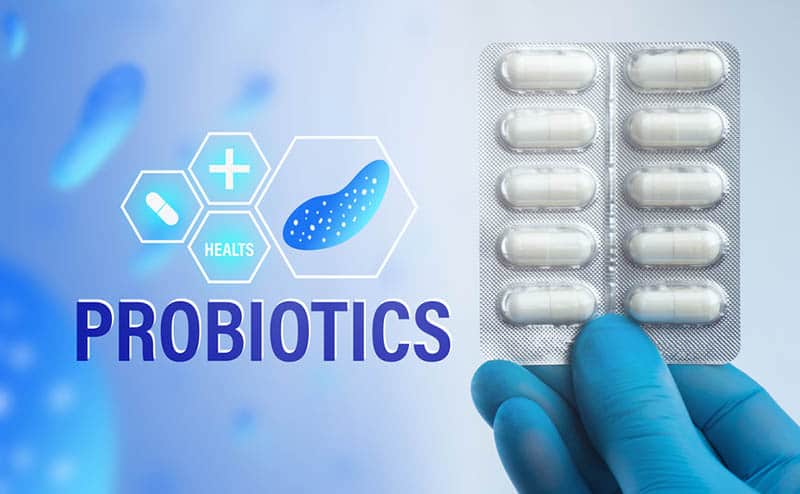
Probiotics are exactly what their name suggests, supplements that help nourish the bacterial flora in the gastrointestinal tract to support a healthy gut.
While the idea of feeding bacteria might sound wrong at first, you should know that there are select strains of probiotics and live bacteria which benefit us and are responsible for the majority of our immune system’s strength.
They help fight off the bad bacteria that travel through our digestive tract, and help keep them at bay.
How Does A Baby Manifest Their Own Bacterial Flora?
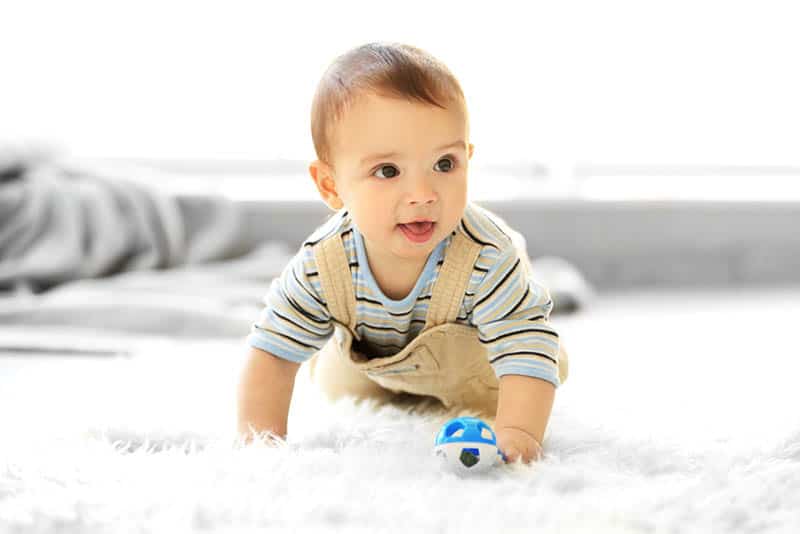
Babies inherit most of their bacterial flora from their mother, which is why the importance of a mother’s diet was specified at the beginning of the article, especially during pregnancy.
Part of it comes directly from the womb, but a large part of it is transferred during the baby’s passage through the birth canal.
This is why babies delivered by C-section need to start taking probiotic supplements straight away, to make up for that loss of microbiota.
This way any potential health issues are prevented before they start taking effect.
However, the child doesn’t have to do that for long, only until they start breastfeeding.
This is because breast milk, especially the colostrum, contains vital antibodies and the best probiotics.
This will help shore up any leftover holes in the defenses of your baby’s tiny tummy, ensuring no nasty diseases afflict them.
This is also why formula-fed babies require some extra supplements alongside their food, because they receive that added health benefit.
They don’t get breastfed due to the potential of lactose intolerance, either temporary or permanent.
This initial lactose intolerance arises due to allergens that may have formed during birth, ones that, ironically, come from a lack of bacterial flora to begin with.
What Strains Of Probiotics Are Beneficial?
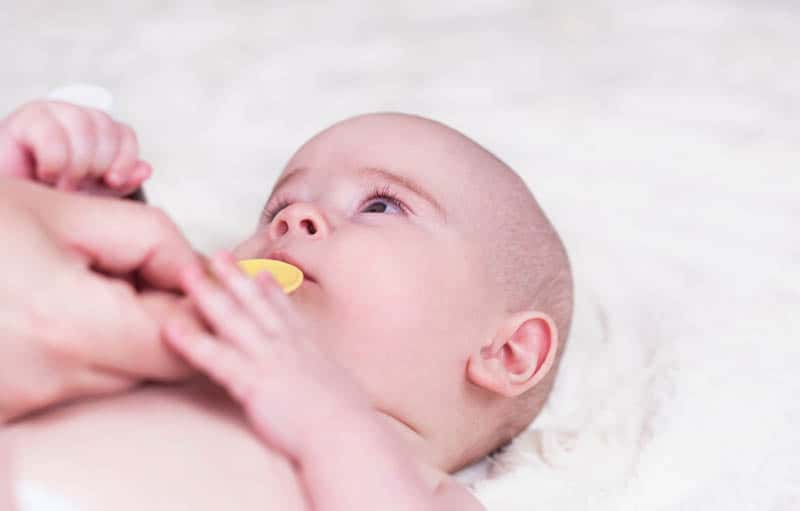
There are many different probiotic strains available, but a select few stand above the rest when it comes to helping renew the beneficial microorganisms found in your baby’s gut.
These are:
• Bifidobacterium bifidum (also known as b.bifidum)
• Lactobacillus reuteri (also known as l. reuteri)
• Bifidobacterium infantis (also known as b.infantis)
• Bifidobacterium lactis (also known as b. lactis)
• Lactobacillus rhamnosus gg (also known as l. rhamnosus gg)
• Saccharomyces boulardii (also known as s. boulardii)
How Do Probiotics Help Babies?
You’ll find that the health of a person’s digestive system plays a big part in their overall health. Not just for babies but for adults too.
In a baby’s case, though, an imbalance of their intestinal flora leads to a weakened immune system, causing all sorts of problems, ranging from mild to severe.
Including:
• A fussier child
• Colic in babies
• Eczema in babies
• Various other skin conditions
• Constipation
• Diarrhea
• Bloating
• Reflux
• Allergies
• Dyspepsia
• and more…
As you can see, there’s quite an extensive list of potential problems that can arise if the healthy bacteria isn’t revitalized, leading to a number of complications if left unchecked.
But, it also serves as evidence for the many health benefits that probiotics provide, not just for digestive health, but overall wellbeing.
If you end up giving your child a steady stream of probiotics, you can expect to see improvements in their overall health, like:
1. Helping fix digestive issues

Both constipation and diarrhea are awful afflictions, particularly for a young child.
One allows the bad bacteria to linger for longer than they have to, while the other has the potential to be so aggressive that it washes out most of the microbiome, leaving your little one’s immune system severely compromised.
In this case, probiotics serve as a recovery system to help return the healthy microbes and rebalance the gut biome.
It helps clear the symptoms of both constipation and diarrhea faster and prevents any other problems from sneaking in due to a weakened immune system.
2. Protects from URTIs

In a similar vein to problems with digestion, probiotics can help defend the child’s respiratory tract from any infections by helping strengthen the immune system and defend it from any nasty bacteria or fungi.
3. Reduces the chance of gut infections

Seeing as how good bacteria are responsible for good gut health, it only makes sense that a steady consumption of probiotics will help to maintain it, reducing the chance of any gut infections from occurring.
4. Helps synthesize healthy vitamins into the body
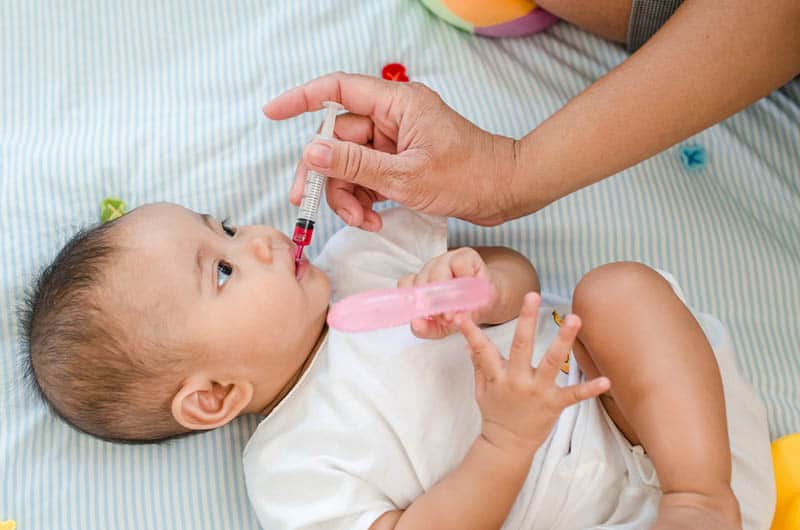
Probiotics don’t just benefit the gut and the immune system.
They also help the body absorb healthy vitamins by allowing the bacteria to produce vitamin B, which helps enormously to that end.
5. Helps reduce the effects of colic and bloating

Proper child healthcare can be really tricky, especially when dealing with colicky and gassy babies.
However, it has been shown that probiotics can aid in resolving colic in babies as well as help clear up large pockets of gas in the baby’s gut (boulardii is really good in this regard).
6. Minimizes the chances of allergies and resolves various skin conditions

Proper probiotic intake allows for the intestinal flora to heal the immune system, which in turn reduces the chance of developing allergies and helps heal eczema, diaper rash, thrush and similar skin problems.
This can also be transferred during pregnancy, if the mother consumes probiotic-rich foods and items as well.
Do be careful though, as some probiotics can have an adverse effect on a pregnancy.
7. Helps deal with child obesity

The overall level of gut health is also responsible for the speed of a child’s metabolism, and a compromised gut biome reduces this speed, making food digestion and nutrient absorption slower.
This in turn leads to an increased chance of child obesity, but a proper intake of probiotics helps to reduce it.
Are There Any Probiotics In Food?
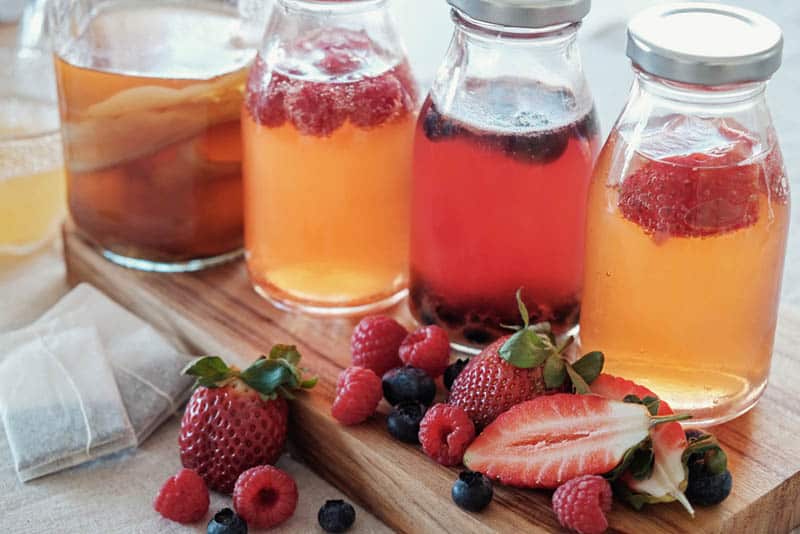
There are indeed some naturally occurring probiotics. Not everything needs to be bought from a pharmacy.
It might be important to supplement probiotic intake for kids, but you can indirectly transfer those probiotics through either your breast milk or through the womb if you’re still pregnant.
The most common sources of probiotic foods are:
• Sauerkraut
• Buttermilk
• Miso soup
• Kimchi
• Kombucha
• Fermented foods (yogurt, kefir, Gouda and cheddar, etc.)
There are other sources too, as well as some more natural supplements that you can find in alternative medicine.
What’s The Best Time Of Day To Give Our Baby Probiotics?
Usually it’s best to take them in the morning paired with breast milk, because then the child gets to feel the effects, though dosages can vary based on the probiotic used at the time.
What You Should Be Aware Of When Buying Probiotics?

Note that probiotics aren’t completely risk free, especially when buying them online from Amazon or anywhere else.
That’s because in American markets, probiotics are registered as dietary supplements and therefore aren’t regulated.
When shopping, ensure that the product you’re buying has at least been approved by an independent source.
But that’s not always enough, you should also make sure to speak with your child’s pediatrician or any other certified health care provider when it comes to dealing with probiotics.
They’ll be able to give their professional opinion on the matter, and tell you whether or not your child needs probiotics in the first place.
They’ll also be able to tell you which specific strains of probiotics you should be on the lookout for, to help with the exact condition that needs to be remedied.
This same rule also applies to pregnant mothers.
Taking certain probiotics may cause involuntary contractions and could lead to preterm labor, so make sure you consult with your physician before taking any new medication.
Another good thing to know is what form the best baby probiotics come in, and that’s usually liquid.
Liquid probiotics are the easiest to give to your babies because they’re easy to mix into baby formula, drip on to breast milk or mix directly into bottles, with your baby being none the wiser.
While not a big deal, it might end up saving you a lot of time and trouble when you need to administer them.
In Conclusion
The best baby probiotics don’t just promote better gut health, but also help deal with various other issues like allergies and skin conditions.
It’s better to provide the necessary intestinal flora during pregnancy if you can, because then there’ll be less need for probiotic supplements, but sometimes it can’t be helped.
This is especially worth noting in a child’s infancy period, when they have to take antibiotics.
They don’t discriminate when they remove bacteria, so it ends up affecting the intestinal flora too, which is why it’s important to take some supplements as well, to help keep a healthy balance.
Just note that you should always consult with a doctor, a pediatrician or any other qualified healthcare provider on the matter before taking that step.
This is because different probiotics help with different things, and you might find certain strains of probiotics outright unhelpful if you choose the wrong ones.
As long as you follow their advice, you should be alright and you can watch your precious baby grow up without any severe health issues.
Like this article? Please share or pin it for later. You can also stay in the loop and follow us on Facebook, Instagram or Pinterest.
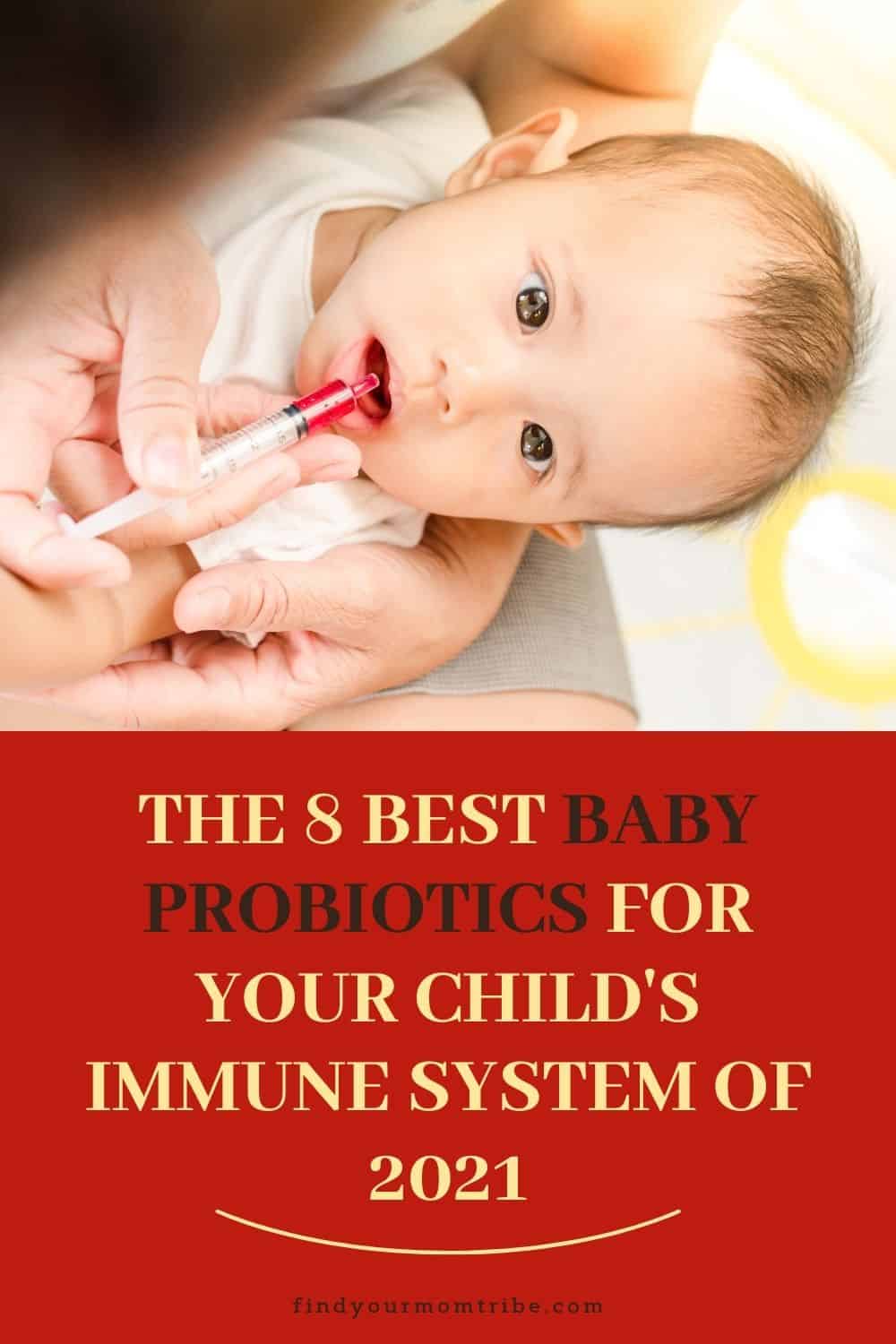
We love honesty! Find Your Mom Tribe is an Amazon Associate and we earn from qualifying purchases through affiliate links at no extra cost to you. Please see our full Amazon Affiliate disclosure for more information.

